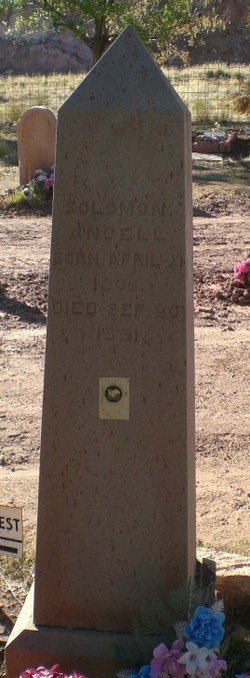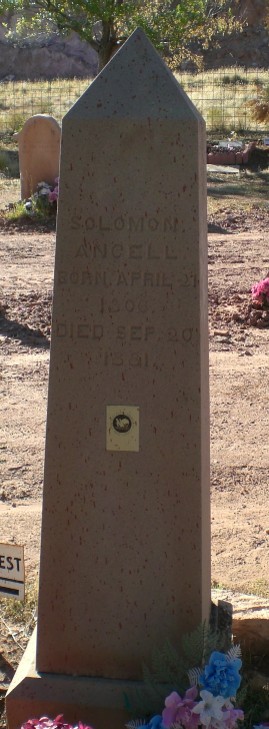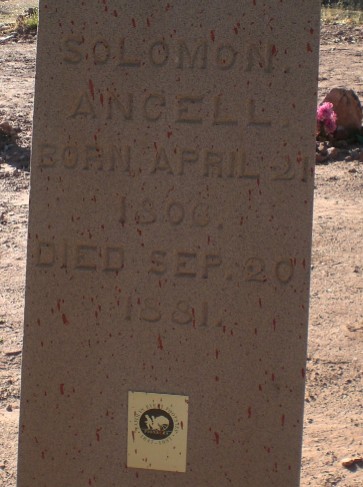Married Eunice Clark Young, 13 April 1828, Providence, Providence, Rhode Island
Married Lucinda Clark, 25 November 1839, Ohio
Married Anna Cajia Johanson, 31 October 1863, Salt Lake City, Salt Lake, Utah
An Enduring Legacy, Volume Two, p. 356
Solomon Angell was born April 26, 1806, in Florence, Oneida County, New York, the son of James Williams and Phoebe Morton Angell. It is interesting to note that his grandfather, Thomas Angell, came to colonial America on the same boat with Roger Williams in 1631. They were fast friends, and together they settled in Plymouth, Massachusetts, the Puritan colony. Roger Williams was a clergyman of the Church of England, and he disagreed violently with some of the Puritan beliefs, chiefly on the
question of religious liberty. So insistent was he on the issue of the separation of church and state that the government banished him and Thomas Angell in 1635.
They went to Rhode Island, where in 1636 they, with ten friends, founded the capital city. They named the new city Providence to commemorate the goodness of God to these
dissenters in distress.
It is not difficult, then, to understand that Solomon Angell was born into a family with traditional reverence for God. His parents were farmers. Unfortunately, they were not too compatible, a fact which resulted in frequent separations. (His father left home when the atmosphere became too heated.)
Solomon's mother heard two missionaries preaching about a new church. She responded readily to the teachings of these elders, Aaron Lyman and Leonard Rich, and she was baptized by them in mid winter. Following her baptism, she took her family to Kirtland, Ohio. Her son Truman O. and his wife, both of whom had accepted the gospel, accompanied the family.
Later, her husband, James Williams (named for Roger Williams), joined the Church and went to Kirtland to be reunited with his family. In due time, the Angell family moved to Far West, Missouri, then crossed the Mississippi River to Illinois—first to Quincy, then in 1841 to Commerce, better known as Nauvoo, on to Winter Quarters, and then to their destination, the area that was to become Utah, arriving under the leadership of Brigham Young on September 20, 1848.
Soon after the Angell family joined the Church, presumably while they still resided in Providence, Solomon married Eunice Clark Young, whose brother was the grandfather of President Harry S. Truman.
The Angell family were preparing to come west with the company led by Ira Eldredge, but when that company left Winter Quarters, Solomon was instructed to remain there
to handle Church affairs. Consequently, Solomon put his widowed mother in the care of his brother Truman O. and his family, and they preceded Solomon to this valley by
a short time.
Truman Angell drew a lot on First South near State Street, where he built his home. His mother lived in her son's home until her death in 1854. Since there was no cemetery at that time, and it was customary for interments to be made on the home lot, Phoebe Morton Angell was laid to rest on the lot of her son's home.
Years later, about 1909 or 1910, workmen who were doing some construction work in that area exhumed a skeleton. There was no identification, so the bones were taken
to the police station. When early records were searched, the skeleton was positively identified as that of Phoebe Morton Angell. Now she sleeps in the family plot in the Salt Lake City Cemetery.
Solomon, who survived her, was a devoted member of the Church. He had been baptized in 1834, and was married to a wonderful woman who gave him her staunch support in
all his Church activities.
Solomon Angell was frequently and lovingly designated as a master of all trades and jack of none. It seems that he could do anything with or without tools—heavy, mechanical or little finicky jobs. He was considered a master workman and was never idle very long at a time.
When he and his wife, Eunice, arrived in Utah, they were the parents of eight children, five sons and three daughters. The eldest, Sarah Elizabeth, had married Jefferson Wright during the course of the journey. The youngest member of the family, a little five-year-old girl, was my mother, Mary, and she walked a good portion of the way.
When Solomon Angell drew a lot on which to build his home, the location was the corner which is now Third South and Third East and one-half block east of the home of Samuel Ensign. Mary Angell was five, Samuel L. Ensign was eleven. Naturally the two youngsters saw each other once or twice in a while. Can you finish the story? When the little girl was sixteen and the young lad nearly twenty-three, the two became one.
Solomon Angell built his house around his wagon box, and it was a lovely, comfortable home which they enjoyed until several of the children were established in their own homes.
In the early 1860s Solomon and Eunice Angell were called to leave their home and family in Salt Lake City and go to southern Utah to help establish and colonize that part of the territory. He aided in the settling of St. George and then went to Leeds, about fifteen miles away. With other pioneers, the Angell's established this Washington County community and here they spent the remainder of their lives.
On May 9, 1869, Erastus Snow appointed Solomon to be presiding elder of the Leeds Ward, St. George Stake, a position he held until 1876. He was also an honored member
of the Thirty-third Quorum of Seventies. Solomon died at his home in Leeds, September 20, 1881. He and Eunice lie side by side in the cemetery at Leeds and many of their posterity still live in the Leeds and St. George areas. — Ivie J. Ensign, granddaughter.
Married Eunice Clark Young, 13 April 1828, Providence, Providence, Rhode Island
Married Lucinda Clark, 25 November 1839, Ohio
Married Anna Cajia Johanson, 31 October 1863, Salt Lake City, Salt Lake, Utah
An Enduring Legacy, Volume Two, p. 356
Solomon Angell was born April 26, 1806, in Florence, Oneida County, New York, the son of James Williams and Phoebe Morton Angell. It is interesting to note that his grandfather, Thomas Angell, came to colonial America on the same boat with Roger Williams in 1631. They were fast friends, and together they settled in Plymouth, Massachusetts, the Puritan colony. Roger Williams was a clergyman of the Church of England, and he disagreed violently with some of the Puritan beliefs, chiefly on the
question of religious liberty. So insistent was he on the issue of the separation of church and state that the government banished him and Thomas Angell in 1635.
They went to Rhode Island, where in 1636 they, with ten friends, founded the capital city. They named the new city Providence to commemorate the goodness of God to these
dissenters in distress.
It is not difficult, then, to understand that Solomon Angell was born into a family with traditional reverence for God. His parents were farmers. Unfortunately, they were not too compatible, a fact which resulted in frequent separations. (His father left home when the atmosphere became too heated.)
Solomon's mother heard two missionaries preaching about a new church. She responded readily to the teachings of these elders, Aaron Lyman and Leonard Rich, and she was baptized by them in mid winter. Following her baptism, she took her family to Kirtland, Ohio. Her son Truman O. and his wife, both of whom had accepted the gospel, accompanied the family.
Later, her husband, James Williams (named for Roger Williams), joined the Church and went to Kirtland to be reunited with his family. In due time, the Angell family moved to Far West, Missouri, then crossed the Mississippi River to Illinois—first to Quincy, then in 1841 to Commerce, better known as Nauvoo, on to Winter Quarters, and then to their destination, the area that was to become Utah, arriving under the leadership of Brigham Young on September 20, 1848.
Soon after the Angell family joined the Church, presumably while they still resided in Providence, Solomon married Eunice Clark Young, whose brother was the grandfather of President Harry S. Truman.
The Angell family were preparing to come west with the company led by Ira Eldredge, but when that company left Winter Quarters, Solomon was instructed to remain there
to handle Church affairs. Consequently, Solomon put his widowed mother in the care of his brother Truman O. and his family, and they preceded Solomon to this valley by
a short time.
Truman Angell drew a lot on First South near State Street, where he built his home. His mother lived in her son's home until her death in 1854. Since there was no cemetery at that time, and it was customary for interments to be made on the home lot, Phoebe Morton Angell was laid to rest on the lot of her son's home.
Years later, about 1909 or 1910, workmen who were doing some construction work in that area exhumed a skeleton. There was no identification, so the bones were taken
to the police station. When early records were searched, the skeleton was positively identified as that of Phoebe Morton Angell. Now she sleeps in the family plot in the Salt Lake City Cemetery.
Solomon, who survived her, was a devoted member of the Church. He had been baptized in 1834, and was married to a wonderful woman who gave him her staunch support in
all his Church activities.
Solomon Angell was frequently and lovingly designated as a master of all trades and jack of none. It seems that he could do anything with or without tools—heavy, mechanical or little finicky jobs. He was considered a master workman and was never idle very long at a time.
When he and his wife, Eunice, arrived in Utah, they were the parents of eight children, five sons and three daughters. The eldest, Sarah Elizabeth, had married Jefferson Wright during the course of the journey. The youngest member of the family, a little five-year-old girl, was my mother, Mary, and she walked a good portion of the way.
When Solomon Angell drew a lot on which to build his home, the location was the corner which is now Third South and Third East and one-half block east of the home of Samuel Ensign. Mary Angell was five, Samuel L. Ensign was eleven. Naturally the two youngsters saw each other once or twice in a while. Can you finish the story? When the little girl was sixteen and the young lad nearly twenty-three, the two became one.
Solomon Angell built his house around his wagon box, and it was a lovely, comfortable home which they enjoyed until several of the children were established in their own homes.
In the early 1860s Solomon and Eunice Angell were called to leave their home and family in Salt Lake City and go to southern Utah to help establish and colonize that part of the territory. He aided in the settling of St. George and then went to Leeds, about fifteen miles away. With other pioneers, the Angell's established this Washington County community and here they spent the remainder of their lives.
On May 9, 1869, Erastus Snow appointed Solomon to be presiding elder of the Leeds Ward, St. George Stake, a position he held until 1876. He was also an honored member
of the Thirty-third Quorum of Seventies. Solomon died at his home in Leeds, September 20, 1881. He and Eunice lie side by side in the cemetery at Leeds and many of their posterity still live in the Leeds and St. George areas. — Ivie J. Ensign, granddaughter.
Family Members
-
![]()
Sarah Elizabeth Angell Wright
1831–1905
-
![]()
Alma Truman Angell
1833–1911
-
![]()
John Osborn Angell
1837–1920
-
![]()
Albert Angell
1841–1906
-
![]()
Mary Angell Ensign
1842–1936
-
![]()
Solomon "Saul" Angell
1861–1922
-
![]()
Charles August Angell
1865–1944
-
![]()
Phoebe Ann Angell McMullin
1867–1953
-
![]()
Adelaide Angell Barlow
1870–1896
-
![]()
Lavinia "Vinnie" Angell Fuller
1872–1957
Advertisement
Records on Ancestry
Sponsored by Ancestry
Advertisement






















